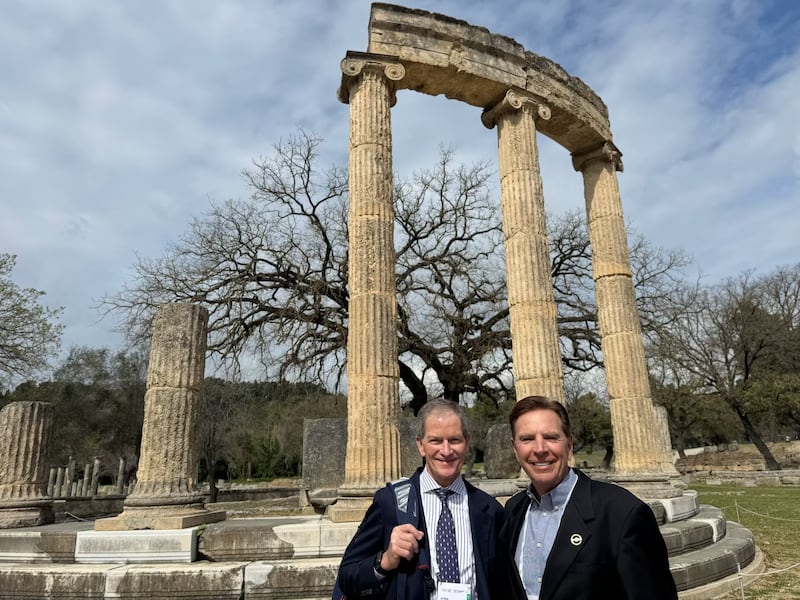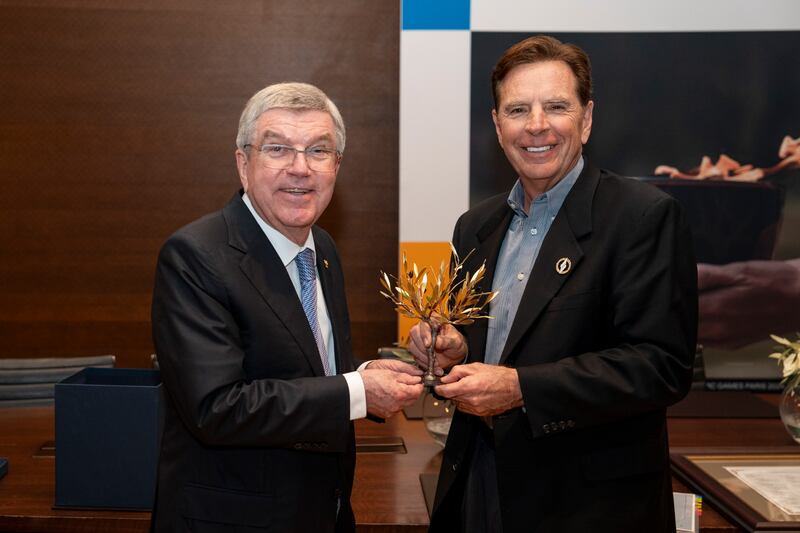Fraser Bullock made the most of sitting across from outgoing International Olympic Committee President Thomas Bach during a two-hour bus ride from the site of the ancient Olympics in Greece.
“We had a great chat,” said Bullock, president and executive chair of Utah’s 2034 Winter Games organizing committee, who is in Greece for this week’s IOC meetings, where a new IOC president will be elected Thursday.
On their way back to the resort town of Costa Navarino Tuesday, Bullock said he and Bach talked about the IOC’s new $3 billion deal with Comcast NBCUniversal that extends the multi-platform company’s U.S. media rights through Utah’s next Olympics as well as the 2036 Summer Games.
Bach told reporters Monday negotiations had been underway for a year.
Utah’s Olympic organizers eventually will receive a share of that and other broadcast rights and international sponsorships negotiated by the IOC, as will the yet-to-be-named host of the 2036 Summer Games.
Exactly how much the new deal means for Utah’s $4 billion Winter Games budget has not been disclosed. Organizers are relying entirely on private funds, currently from donors but later largely raised from the sale of broadcast rights, international and domestic sponsorships, and tickets.

“I congratulated him on the successful renewal,” Bullock said of his conversation with the IOC president, telling him “how important that was to us, and how we can work together to leverage their technology.”
At the end of the exchange, Bullock said he and Bach “did a high-five.”
Later that evening, the pair exchanged gifts. Bullock gave Bach a copy of five generations of his family history prepared by The Church of Jesus Christ of Latter-day Saints. And Bach gave him a sculpture of an olive tree, the source of the wreaths worn by ancient Olympic champions.
“He learned many new things about his family. It is always special when we learn more about our heritage,” Bullock said, describing how he and Bach spent a half-hour together sharing family history anecdotes.
One of the organizing committee’s two paid employees, Darren Hughes, vice president of operations and planning, is also in Greece. Utah Games CEO Brad Wilson didn’t make the trip because a daughter was returning this week from a Latter-day Saint mission.
In Greece, the Utah organizers are spending time with their counterparts from the 2028 Summer Games in Los Angeles and the 2030 Winter Games in the French Alps, as well as with key members of the IOC staff and several international sport federations, including hockey.
But aside from the behind-the-scenes meetings, there’s not much attention being paid to the 2034 Games at the IOC’s annual session that began with Tuesday’s opening ceremony in Olympia and continues through Thursday.
A presentation by the Utah organizing committee scheduled Thursday, the same day as the IOC presidential election, was scrapped in favor of a written report. Bullock said he was notified a month ago there wasn’t time for the session to hear from Utah.

The written report is not public but will be acknowledged during the session, he said, calling it “a collaboration with the IOC, brief, giving an update that we formed the organizing committee and have initiated our work.”
It’s only been a month since the details of the entity responsible for putting on the state’s next Winter Games were announced, including the leaders selected by Gov. Spencer Cox, Senate President Stuart Adams, R-Layton, and House Speaker Mike Schultz, R-Hooper.
Bullock, however, is not new to what’s known as the Olympic movement. He’s been involved since serving as the chief operating officer of the 2002 Winter Games in Salt Lake City under former U.S. Sen. Mitt Romney and led the bid to bring the Olympics back to Utah.
At Wednesday’s IOC session, Bullock made a brief appearance in a video tribute to Bach, praising the changes made under Bach’s 12-year tenure as president to the way cities and now even multiple regions and countries bid to host a Games.
Bidding under the new, less formal process “has gone from being competitive to being collaborative. It’s a partnership. And it’s been a wonderful experience for us in Salt Lake, to work hand in hand with the IOC and particularly President Bach,” Bullock says in the video.
The 45 seconds in the nearly half-hour video that showcases Utah as final of five future Games sites selected under Bach’s leadership also offers a quick glimpse of Cox at last summer’s Paris Games as well as sweeping shots of Salt Lake City and skiers on snow-covered Utah peaks.
Appearing in the video, Bullock said, was “a special privilege.”
Utah’s organizers do not have a favorite among the seven IOC members vying to replace Bach, Bullock has said. The race is widely seen as between Great Britain’s Sebastian Coe, Zimbabwe’s Kirsty Coventry and Spain’s Juan Antonio Samaranch Jr.


